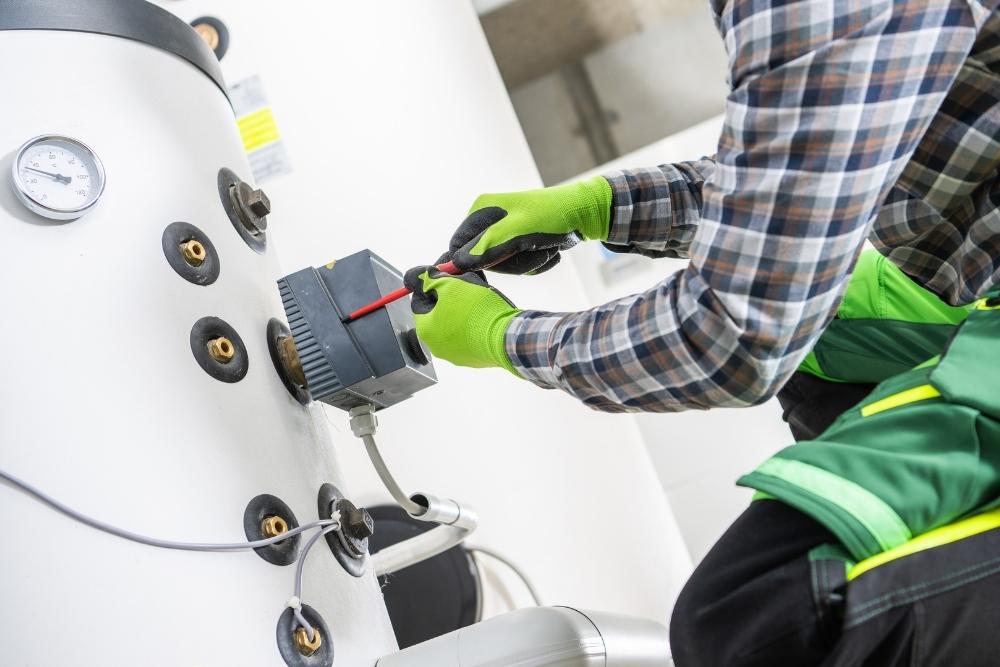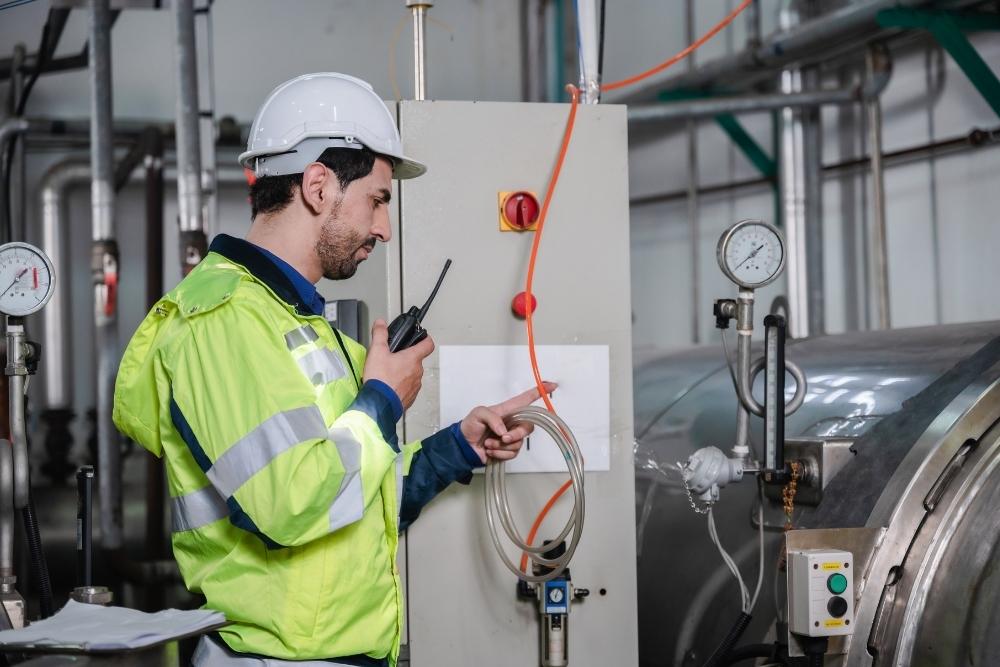Ever had a chinwag about the differences between tanked and tankless hot water systems? We certainly have. After a good deal of research, we’ve discovered that the main points of difference are energy efficiency, lifespan, cost and naturally, maintenance routines.
In this article, we’re going to dive right into these differences and provide you with a comprehensive comparison of how to take care of both types of systems. Ready for some scorching facts? Stick around, mate!
Key Takeaways
- Tankless hot water systems have a longer average lifespan of 20-30 years compared to tanked systems, which typically last around 10-15 years.
- Regular maintenance is essential for both tanked and tankless hot water systems to ensure optimal performance and extend their lifespan.
- Tankless hot water systems offer energy efficiency savings due to their lack of standby heat loss, while tanked systems are generally more affordable upfront but may be more prone to rust and leaks.
- Whether you choose a tanked or tankless system, routine maintenance is necessary to ensure a reliable hot water supply.

Overview of Tanked and Tankless Hot Water Systems
Tanked hot water systems are traditional storage tank heaters that use a large tank to store and heat water, while tankless hot water systems, also known as on-demand or instantaneous heaters, heat the water as it flows through a heating element.
How they work
Tanked hot water systems work by storing and heating a large amount of water in an insulated tank. The tank continuously heats the water to maintain a set temperature, even when no one is using it.
On the other hand, tankless hot water systems heat the water directly without any storage. As soon as you turn on a hot tap, cold water travels through a pipe into the unit, where either an electric element or gas burner heats it instantly.
This means you get unlimited access to instant hot water with tankless models while maintaining high energy efficiency due to their lack of standby heat loss.
Energy efficiency
Tankless water heaters are known for their superior energy efficiency compared to tank storage water heaters. With regular servicing, tankless water heaters can provide a reliable hot water supply while offering significant energy savings.
In fact, homes that use 41 gallons or less of hot water daily can save between 24% and 34% on their energy bills with a tankless system. This is because tankless water heaters do not experience standby heat loss like storage tanks, making them more efficient in heating only the amount of hot water needed at any given time.
So if you’re looking to reduce your energy consumption and save money in the long run, consider the energy-efficient option of a tankless hot water system.
Purchase and installation costs
When it comes to the purchase and installation costs of hot water systems, there are some key differences between tanked and tankless options. Tank storage water heaters are generally less expensive upfront compared to tankless models.
This makes them a more budget-friendly choice for homeowners who are looking for a cost-effective option. On the other hand, tankless water heaters have higher upfront costs due to their advanced technology and energy efficiency features.
Although they may require a larger investment initially, their longer lifespan and energy savings can make them a worthwhile investment in the long run. So whether you’re looking for an affordable option or willing to invest for long-term savings, considering the purchase and installation costs is essential when choosing between tanked and tankless hot water systems.
Performance
Tankless water heaters offer exceptional performance when it comes to providing a reliable and continuous supply of hot water. With regular servicing, these systems can ensure optimal performance and longevity.
They are also more energy-efficient than storage tank water heaters, resulting in significant savings on your utility bills. Tankless water heaters do not experience standby heat loss like their tanked counterparts, making them even more efficient.
Additionally, tankless water heaters have a longer lifespan compared to storage tanks, lasting an average of 20-30 years. So if you’re looking for a hot water system that delivers dependable performance and energy efficiency, consider opting for a tankless water heater.
Duration of use
Tankless water heaters have a longer lifespan compared to tank storage water heaters, lasting an average of 20-30 years. This means you won’t have to replace your tankless system as frequently as a traditional tanked system.
With regular servicing, tankless water heaters can provide reliable hot water for many years. So, if you’re looking for a hot water system that will stand the test of time and require less frequent replacements, consider investing in a tankless water heater.
Other considerations
In addition to maintenance requirements, there are other factors to consider when choosing between tanked and tankless hot water systems. One important consideration is the size of your home and its hot water needs.
Tankless water heaters are compact and take up less space compared to storage tanks, making them a great choice for homes with limited space. On the other hand, tank-style water heaters have larger capacities and can accommodate households with higher simultaneous hot water needs.
Another factor to consider is the upfront cost. Storage tank water heaters are generally less expensive to purchase and install compared to tankless models. However, it’s important to note that while tankless units may have a higher initial cost, they offer energy efficiency savings in the long run.
Tankless water heaters can save you 24% to 34% on energy bills if your daily hot water usage is 41 gallons or less.
Lastly, think about lifespan and reliability. Tankless water heaters have a longer average lifespan of 20-30 years compared to storage tanks which typically last around 10-15 years.
This means that investing in a tankless system may provide you with a more reliable hot water supply for many years.
Comparing Maintenance
In terms of maintenance, tanked hot water systems require regular servicing and are more prone to repair needs due to rust and leaks. On the other hand, tankless hot water systems have advanced maintenance requirements but boast a longer lifespan.

Regular maintenance
Maintaining your hot water system is essential to ensure its optimal performance and longevity. For tanked hot water systems, regular maintenance involves checking for any signs of rust or leaks, flushing the tank to remove sediment buildup, and inspecting the sacrificial anode rod.
Additionally, it’s important to have a professional service technician conduct an annual inspection and tune-up. On the other hand, tankless hot water systems require periodic descaling to prevent mineral buildup in the heat exchanger and regular cleaning of inlet filters.
It’s also recommended to have a technician perform a checkup every few years to ensure that all components are working properly. By staying on top of regular maintenance tasks for your hot water system, you can enjoy a reliable hot water supply and extend its lifespan.
Repair needs
Maintaining a tankless hot water system requires regular attention to avoid any potential repair needs. It is important to perform routine maintenance tasks such as flushing the system regularly and checking for leaks or malfunctions.
By staying on top of these repairs, you can ensure that your tankless water heater continues to provide reliable hot water for years to come. The longer lifespan of tankless systems makes it even more crucial to address any repair needs promptly, as they can extend the overall lifespan of the unit and save you money in the long run.
Lifespan
Tankless water heaters have a longer lifespan compared to tank storage water heaters. On average, tankless water heaters can last for 20-30 years with regular maintenance and care.
This means that you won’t need to worry about replacing your hot water system as frequently, saving you money in the long run. With proper servicing, tankless water heaters can provide a reliable supply of hot water for many years, giving you peace of mind knowing that your household’s hot water needs will be met consistently.
So, if you’re looking for a hot water system that offers longevity and reliability, consider investing in a tankless water heater.
Storage tank water heaters typically have a shorter lifespan than their tankless counterparts. While they still offer efficient performance during their lifetime, the average life expectancy of a storage tank heater is generally around 10-15 years with regular maintenance.
This means that you may find yourself needing to replace your storage tank heater more frequently compared to a tankless system. If durability is an important factor when choosing your hot water system, it might be worth considering the longer lifespan offered by tankless options.
Advantages and Disadvantages of Tanked Hot Water Systems
Tanked hot water systems have a lower upfront cost and simpler maintenance, but they are more prone to rust and leaks with a limited lifespan. Want to know more about the pros and cons? Keep reading!
Lower upfront cost
Tanked hot water systems generally have a lower upfront cost compared to tankless water heaters. This means that if you’re on a tight budget, opting for a tanked system might be more affordable initially.
However, it’s important to keep in mind that while the upfront cost may be lower, there are other factors to consider such as maintenance and energy efficiency savings over time.
Simpler maintenance
Maintaining a tanked hot water system is generally simpler compared to a tankless system. With tanked water heaters, maintenance typically involves flushing the tank once a year to remove sediment buildup and checking for any leaks or corrosion.
This process can be easily done by homeowners or with the help of a professional plumber. Additionally, tanked systems usually have fewer intricate parts that require regular servicing, making their maintenance less complicated overall.
However, it’s important to remember that regular maintenance is still crucial to ensure optimal performance and avoid any potential issues in the long run.
More prone to rust and leaks
Tank storage water heaters are more prone to rust and leaks compared to tankless water heaters. Over time, the metal tank of a traditional water heater can develop corrosion, leading to rust issues.
This can not only affect the appearance of your water heater but also compromise its performance and lifespan. Additionally, the pressure from stored hot water can cause small cracks in the tank, resulting in leaks that may damage surrounding areas.
Regular maintenance is essential for identifying and addressing these issues early on to prevent further damage and ensure the safe operation of your tanked hot water system.
Limited lifespan
Tank water heaters have a limited lifespan compared to tankless water heaters. On average, tanked systems last around 10-15 years before they may start experiencing issues or need replacement.
This means that homeowners with tanked hot water systems will likely need to replace their units sooner than those with tankless models, which can last up to 20-30 years with proper maintenance.
It’s important for homeowners to consider the long-term cost and durability when deciding between these two types of hot water systems.

Advantages and Disadvantages of Tankless Hot Water Systems
Tankless hot water systems have higher upfront costs but offer advanced maintenance and a longer lifespan.
Higher upfront cost
Tankless hot water systems have a higher upfront cost compared to tanked hot water systems. This is because tankless water heaters are more advanced and efficient, which means they come with a higher price tag.
However, it’s important to consider the long-term benefits and savings that come with a tankless system. Despite the initial investment, tankless water heaters offer energy efficiency savings of 24% to 34%, resulting in lower monthly utility bills.
Additionally, tankless water heaters have a longer lifespan of around 20-30 years compared to tanked systems. So while you may pay more upfront, you’ll enjoy a reliable hot water supply and potential cost savings for many years to come.
Advanced maintenance
Maintaining a tankless hot water system requires some advanced maintenance tasks to ensure optimal performance and longevity. One important task is descaling the heat exchanger periodically to remove mineral buildup, which can affect efficiency and lead to damage if left untreated.
Another task is checking the combustion chamber for any debris or blockages that could impact the unit’s operation. Additionally, it’s crucial to inspect and clean the air intake filter regularly to prevent dust accumulation and maintain proper airflow.
By staying on top of these advanced maintenance tasks, you can ensure your tankless hot water system continues providing reliable hot water for years to come while maximising energy efficiency.
Longer lifespan
Tankless water heaters have a significant advantage over tank storage water heaters when it comes to lifespan. On average, tankless water heaters can last for 20-30 years, which is substantially longer than the lifespan of tank-style units.
This means that by choosing a tankless system, homeowners can enjoy a reliable hot water supply without worrying about replacing their unit for many years. Regular maintenance plays a crucial role in ensuring optimal performance and durability of tankless water heaters throughout their extended lifespan.
Heating Up Your Space, One Repair at a Time
In conclusion, when comparing tanked and tankless hot water system maintenance, it is important to consider the lifespan, energy efficiency, and regular servicing needs. Tankless water heaters have a longer lifespan and offer energy savings with regular maintenance.
On the other hand, tanked water heaters may require simpler maintenance but are more prone to rust and leaks. Ultimately, the choice between the two depends on individual preferences and needs for a reliable hot water supply.
Ready to make an informed choice for your hot water system? Hot Water Repairs Today is your expert guide in comparing tanked and tankless systems for efficient maintenance. Don’t let uncertainty impact your comfort – take action now. Contact us for insights into the specific maintenance needs of tanked and tankless hot water systems. Trust Hot Water Repairs Today to be your go-to partner in ensuring both types of systems operate reliably. Don’t wait for inefficiencies to disrupt your hot water supply – reach out now and understand the maintenance practices that suit your system. Act today for a hot water system that meets your needs, whether tanked or tankless. Contact us now!






